When the World Shook (5)
By:
April 6, 2012
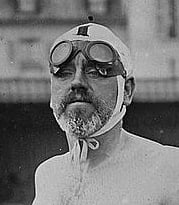
HILOBROW is pleased to present the fifth installment of our serialization of H. Rider Haggard’s When the World Shook. New installments will appear each Friday for 24 weeks.
Marooned on a South Sea island, Humphrey Arbuthnot and his friends awaken the last two members of an advanced race, who have spent 250,000 years in a state of suspended animation. Using astral projection, Lord Oro visits London and the battlefields of the Western Front; horrified by the degraded state of modern civilization, he activates chthonic technology capable of obliterating it. Will Oro’s beautiful daughter, Yva, who has fallen in love with Humphrey, stop him in time?
“If this is pulp fiction it’s high pulp: a Wagnerian opera of an adventure tale, a B-movie humanist apocalypse and chivalric romance,” says Lydia Millet in a blurb written for HiLoBooks. “When the World Shook has it all — English gentlemen of leisure, a devastating shipwreck, a volcanic tropical island inhabited by cannibals, an ancient princess risen from the grave, and if that weren’t enough a friendly, ongoing debate between a godless materialist and a devout Christian. H. Rider Haggard’s rich universe is both profoundly camp and deeply idealistic.”
Haggard’s only science fiction novel was first published in 1919. In September 2012, HiLoBooks will publish a beautiful new edition of When the World Shook, with an introduction by Atlantic Monthly contributing editor James Parker. NOW AVAILABLE FOR PRE-ORDERING!
SUBSCRIBE to HILOBROW’s serialized fiction via RSS.
LAST WEEK: “‘I wonder where we are going to?’ I said to Bickley. ‘To the land of sleep, Humphrey, I imagine,’ he replied in a more gentle voice than I had often heard him use, adding: ‘Good-bye, old boy, we have been real friends, haven’t we, notwithstanding my peculiarities? I only wish that I could think that there was anything in Bastin’s views. But I can’t, I can’t. It’s good night for us poor creatures!'”
ALL EXCERPTS: 1 | 2 | 3 | 4 | 5 | 6 | 7 | 8 | 9 | 10 | 11 | 12 | 13 | 14 | 15 | 16 | 17 | 18 | 19 | 20 | 21 | 22 | 23 | 24
LAND
At last the electric light really went out. I had looked at my watch just before this happened and wound it up, which, Bickley remarked, was superfluous and a waste of energy. It then marked 3.20 in the morning. We had wedged Bastin, who was now snoring comfortably, into his berth, with pillows, and managed to tie a cord over him — no, it was a large bath towel, fixing one end of it to the little rack over his bed and the other to its framework. As for ourselves, we lay down on the floor between the table legs, which, of course, were screwed, and the settee, protecting ourselves as best we were able by help of the cushions, etc., between two of which we thrust the terrified Tommy who had been sliding up and down the cabin floor. Thus we remained, expecting death every moment till the light of day, a very dim light, struggling through a port-hole of which the iron cover had somehow been wrenched off. Or perhaps it was never shut, I do not remember.
About this time there came a lull in the hellish, howling hurricane; the fact being, I suppose, that we had reached the centre of the cyclone. I suggested that we should try to go on deck and see what was happening. So we started, only to find the entrance to the companion so faithfully secured that we could not by any means get out. We knocked and shouted, but no one answered. My belief is that at this time everyone on the yacht except ourselves had been washed away and drowned.
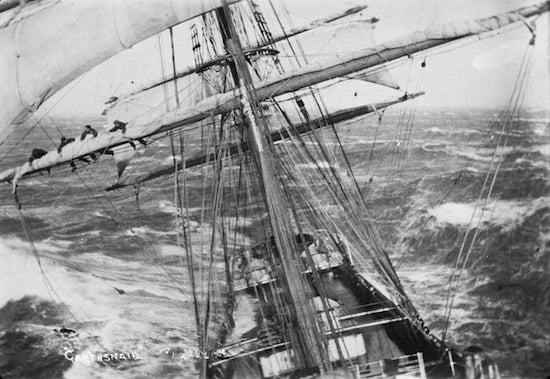
Then we returned to the saloon, which, except for a little water trickling about the floor, was marvelously dry, and, being hungry, retrieved some bits of food and biscuit from its corners and ate. At this moment the cyclone began to blow again worse than ever, but it seemed to us, from another direction, and before it sped our poor derelict barque. It blew all day till for my part I grew utterly weary and even longed for the inevitable end. If my views were not quite those of Bastin, certainly they were not those of Bickley. I had believed from my youth up that the individuality of man, the ego, so to speak, does not die when life goes out of his poor body, and this faith did not desert me then. Therefore, I wished to have it over and learn what there might be upon the other side.
We could not speak much because of the howling of the wind, but Bickley did manage to shout to me something to the effect that his partners would, in his opinion, make an end of their great practice within two years, which, he added, was a pity. I nodded my head, not caring twopence what happened to Bickley’s partners or their business, or to my own property, or to anything else. When death is at hand most of us do not think much of such things because then we realise how small they are. Indeed I was wondering whether within a few minutes or hours I should or should not see Natalie again, and if this were the end to which she had seemed to beckon me in that dream.
On we sped, and on. About four in the afternoon we heard sounds from Bastin’s cabin which faintly reminded me of some tune. I crept to the door and listened. Evidently he had awakened and was singing or trying to sing, for music was not one of his strong points, “For those in peril on the sea.” Devoutly did I wish that it might be heard. Presently it ceased, so I suppose he went to sleep again.
The darkness gathered once more. Then of a sudden something fearful happened. There were stupendous noises of a kind I had never heard; there were convulsions. It seemed to us that the ship was flung right up into the air a hundred feet or more.
“Tidal wave, I expect,” shouted Bickley.
Almost as he spoke she came down with the most appalling crash on to something hard and nearly jarred the senses out of us. Next the saloon was whirling round and round and yet being carried forward, and we felt air blowing upon us. Then our senses left us. As I clasped Tommy to my side, whimpering and licking my face, my last thought was that all was over, and that presently I should learn everything or nothing.
I woke up feeling very bruised and sore and perceived that light was flowing into the saloon. The door was still shut, but it had been wrenched off its hinges, and that was where the light came in; also some of the teak planks of the decking, jagged and splintered, were sticking up through the carpet. The table had broken from its fastenings and lay upon its side. Everything else was one confusion. I looked at Bickley. Apparently he had not awakened. He was stretched out still wedged in with his cushions and bleeding from a wound in his head. I crept to him in terror and listened. He was not dead, for his breathing was regular and natural. The whisky bottle which had been corked was upon the floor unbroken and about a third full. I took a good pull at the spirit; to me it tasted like nectar from the gods. Then I tried to force some down Bickley’s throat but could not, so I poured a little upon the cut on his head. The smart of it woke him in a hurry.
“Where are we now?” he exclaimed. “You don’t mean to tell me that Bastin is right after all and that we live again somewhere else? Oh! I could never bear that ignominy.”
“I don’t know about living somewhere else,” I said, “although my opinions on that matter differ from yours. But I do know that you and I are still on earth in what remains of the saloon of the Star of the South.”
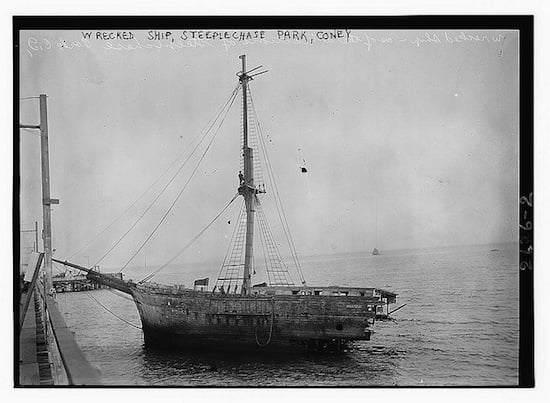
“Thank God for that! Let’s go and look for old Bastin,” said Bickley. “I do pray that he is all right also.”
“It is most illogical of you, Bickley, and indeed wrong,” groaned a deep voice from the other side of the cabin door, “to thank a God in Whom you do not believe, and to talk of praying for one of the worst and most inefficient of His servants when you have no faith in prayer.”
“Got you there, my friend,” I said.
Bickley murmured something about force of habit, and looked smaller than I had ever seen him do before.
Somehow we forced that door open; it was not easy because it had jammed. Within the cabin, hanging on either side of the bath towel which had stood the strain nobly, something like a damp garment over a linen line, was Bastin most of whose bunk seemed to have disappeared. Yes —Bastin, pale and dishevelled and looking shrunk, with his hair touzled and his beard apparently growing all ways, but still Bastin alive, if very weak.
Bickley ran at him and made a cursory examination with his fingers.
“Nothing broken,” he said triumphantly. “He’s all right.”
“If you had hung over a towel for many hours in most violent weather you would not say that,” groaned Bastin. “My inside is a pulp. But perhaps you would be kind enough to untie me.”
“Bosh!” said Bickley as he obeyed. “All you want is something to eat. Meanwhile, drink this,” and he handed him the remains of the whisky.
Bastin swallowed it every drop, murmuring something about taking a little wine for his stomach’s sake, “one of the Pauline injunctions, you know,” after which he was much more cheerful. Then we hunted about and found some more of the biscuits and other food with which we filled ourselves after a fashion.
“I wonder what has happened,” said Bastin. “I suppose that, thanks to the skill of the captain, we have after all reached the haven where we would be.”
Here he stopped, rubbed his eyes and looked towards the saloon door which, as I have said, had been wrenched off its hinges, but appeared to have opened wider than when I observed it last. Also Tommy, who was recovering his spirits, uttered a series of low growls.
“It is a most curious thing,” he went on, “and I suppose I must be suffering from hallucinations, but I could swear that just now I saw looking through that door the same improper young woman clothed in a few flowers and nothing else, whose photograph in that abominable and libellous book was indirectly the cause of our tempestuous voyage.”
“Indeed!” replied Bickley. “Well, so long as she has not got on the broken-down stays and the Salvation Army bonnet without a crown, which you may remember she wore after she had fallen into the hands of your fraternity, I am sure I do not mind. In fact I should be delighted to see anything so pleasant.”
At this moment a distinct sound of female tittering arose from beyond the door. Tommy barked and Bickley stepped towards it, but I called to him.
“Look out! Where there are women there are sure to be men. Let us be ready against accidents.”
So we armed ourselves with pistols, that is Bickley and I did, Bastin being fortified solely with a Bible.
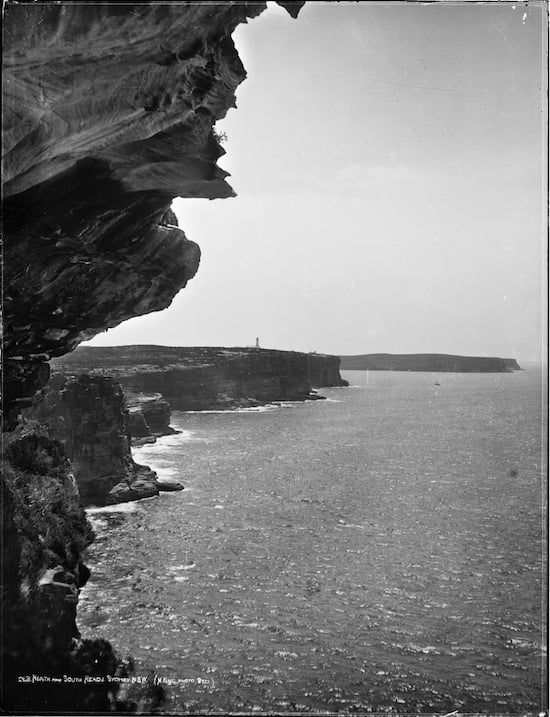
Then we advanced, a remarkable and dilapidated trio, and dragged the door wide. Instantly there was a scurry and we caught sight of women’s forms wearing only flowers, and but few of these, running over white sand towards groups of men armed with odd-looking clubs, some of which were fashioned to the shapes of swords and spears. To make an impression I fired two shots with my revolver into the air, whereupon both men and women fled into groves of trees and vanished.
“They don’t seem to be accustomed to white people,” said Bickley. “Is it possible that we have found a shore upon which no missionary has set a foot?”
“I hope so,” said Bastin, “seeing that unworthy as I am, then the opportunities for me would be very great.”
We stood still and looked about us. This was what we saw. All the after part of the ship from forward of the bridge had vanished utterly; there was not a trace of it; she had as it were been cut in two. More, we were some considerable distance from the sea which was still raging over a quarter of a mile away where great white combers struck upon a reef and spouted into the air. Behind us was a cliff, apparently of rock but covered with earth and vegetation, and against this cliff, in which the prow of the ship was buried, she, or what remained of her, had come to anchor for the last time.
“You see what has happened,” I said. “A great tidal wave has carried us up here and retreated.”
“That’s it,” exclaimed Bickley. “Look at the débris,” and he pointed to torn-up palms, bushes and seaweed piled into heaps which still ran salt water; also to a number of dead fish that lay about among them, adding, “Well, we are saved anyhow.”
“And yet there are people like you who say that there is no Providence!” ejaculated Bastin.
“I wonder what the views of Captain Astley and the crew are, or rather were, upon that matter,” interrupted Bickley.
“I don’t know,” answered Bastin, looking about him vaguely. “It is true that I can’t see any of them, but if they are drowned no doubt it is because their period of usefulness in this world had ended.”
“Let’s get down and look about us,” I remarked, being anxious to avoid further argument.
So we scrambled from the remnant of the ship, like Noah descending out of the ark, as Bastin said, on to the beach beneath, where Tommy rushed to and fro, gambolling for joy. Here we discovered a path which ran diagonally up the side of a cliff which was nowhere more than fifty or sixty feet in height, and possibly had once formed the shore of this land, or perhaps that of a lake. Up this path we went, following the tracks of many human feet, and reaching the crest of the cliff, looked about us, basking as we did so in the beautiful morning sun, for the sky was now clear of clouds and with that last awful effort, which destroyed our ship, the cyclone had passed away.
We were standing on a plain down which ran a little stream of good water whereof Tommy drank greedily, we following his example. To the right and left of this plain, further than we could see, stretched bushland over which towered many palms, rather ragged now because of the lashing of the gale. Looking inland we perceived that the ground sloped gently downwards, ending at a distance of some miles in a large lake. Far out in this lake something like the top of a mountain of a brown colour rose above the water, and on the edge of it was what from that distance appeared to be a tumbled ruin.
“This is all very interesting,” I said to Bickley. “What do you make of it?”
“I don’t quite know. At first sight I should say that we are standing on the lip of a crater of some vast extinct volcano. Look how it curves to north and south and at the slope running down to the lake.”
I nodded.
“Lucky that the tidal wave did not get over the cliff,” I said. “If it had the people here would have all been drowned out. I wonder where they have gone?”
As I spoke Bastin pointed to the edge of the bush some hundreds of yards away, where we perceived brown figures slipping about among the trees. I suggested that we should go back to the mouth of our path, so as to have a line of retreat open in case of necessity, and await events. So we did and there stood still. By degrees the brown figures emerged on to the plain to the number of some hundreds, and we saw that they were both male and female. The women were clothed in nothing except flowers and a little girdle; the men were all armed with wooden weapons and also wore a girdle but no flowers. The children, of whom there were many, were quite naked.
Among these people we observed a tall person clothed in what seemed to be a magnificent feather cloak, and, walking around and about him, a number of grotesque forms adorned with hideous masks and basket-like head-dresses that were surmounted by plumes.
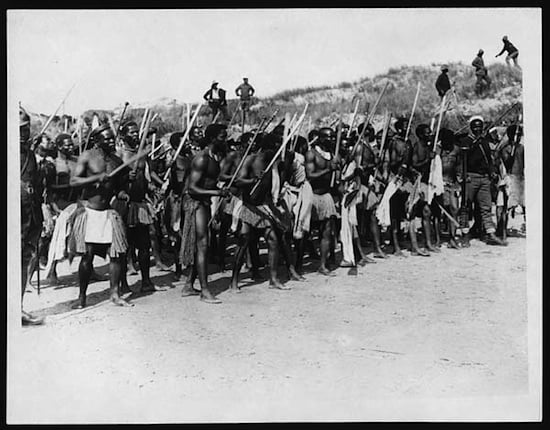
“The king or chief and his priests or medicine-men! This is splendid,” said Bickley triumphantly.
Bastin also contemplated them with enthusiasm as raw material upon which he hoped to get to work.
By degrees and very cautiously they approached us. To our joy, we perceived that behind them walked several young women who bore wooden trays of food or fruit.
“That looks well,” I said. “They would not make offerings unless they were friendly.”
“The food may be poisoned,” remarked Bickley suspiciously.
The crowd advanced, we standing quite still looking as dignified as we could, I as the tallest in the middle, with Tommy sitting at my feet. When they were about five and twenty yards away, however, that wretched little dog caught sight of the masked priests. He growled and then rushed at them barking, his long black ears flapping as he went.
The effect was instantaneous. One and all they turned and fled precipitately, who evidently had never before seen a dog and looked upon it as a deadly creature. Yes, even the tall chief and his masked medicine-men fled like hares pursued by Tommy, who bit one of them in the leg, evoking a terrific howl. I called him back and took him into my arms. Seeing that he was safe for a while the crowd reformed and once again advanced.
As they came we noted that they were a wonderfully handsome people, tall and straight with regularly shaped features and nothing of the negro about them. Some of the young women might even be called beautiful, though those who were elderly had become corpulent. The feather-clothed chief, however, was much disfigured by a huge growth with a narrow stalk to it that hung from his neck and rested on his shoulder.
“I’ll have that off him before he is a week older,” said Bickley, surveying this deformity with great professional interest.
On they came, the girls with the platters walking ahead. On one of these were what looked like joints of baked pork, on another some plantains and pear-shaped fruits. They knelt down and offered these to us. We contemplated them for a while. Then Bickley shook his head and began to rub his stomach with appropriate contortions. Clearly they were quick-minded enough for they saw the point. At some words the girls brought the platters to the chief and others, who took from them portions of the food at hazard and ate them to show that it was not poisoned, we watching their throats the while to make sure that it was swallowed. Then they returned again and we took some of the food though only Bickley ate, because, as I pointed out to him, being a doctor who understood the use of antidotes; clearly he should make the experiment. However, nothing happened; indeed he said that it was very good.
After this there came a pause. Then suddenly Bastin took up his parable in the Polynesian tongue which — to a certain extent — he had acquired with so much pains.
“What is this place called?” he asked slowly and distinctly, pausing between each word.
His audience shook their heads and he tried again, putting the accents on different syllables. Behold! some bright spirit understood him and answered:
“Orofena.”
“That means a hill, or an island, or a hill in an island,” whispered Bickley to me.
“Who is your God?” asked Bastin again.
The point seemed one upon which they were a little doubtful, but at last the chief answered, “Oro. He who fights.”
“In other words, Mars,” said Bickley.
“I will give you a better one,” said Bastin in the same slow fashion.
Thinking that he referred to himself these children of Nature contemplated his angular form doubtfully and shook their heads. Then for the first time one of the men who was wearing a mask and a wicker crate on his head, spoke in a hollow voice, saying:
“If you try Oro will eat you up.”
“Head priest!” said Bickley, nudging me. “Old Bastin had better be careful or he will get his teeth into him and call them Oro’s.”
Another pause, after which the man in a feather cloak with the growth on his neck that a servant was supporting, said:
“I am Marama, the chief of Orofena. We have never seen men like you before, if you are men. What brought you here and with you that fierce and terrible animal, or evil spirit which makes a noise and bites?”
Now Bickley pretended to consult me who stood brooding and majestic, that is if I can be majestic. I whispered something and he answered:
“The gods of the wind and the sea.”
“What nonsense,” ejaculated Bastin, “there are no such things.”
“Shut up,” I said, “we must use similes here,” to which he replied:
“I don’t like similes that tamper with the truth.”
“Remember Neptune and Aeolus,” I suggested, and he lapsed into consideration of the point.
“We knew that you were coming,” said Marama. “Our doctors told us all about you a moon ago. But we wish that you would come more gently, as you nearly washed away our country.”
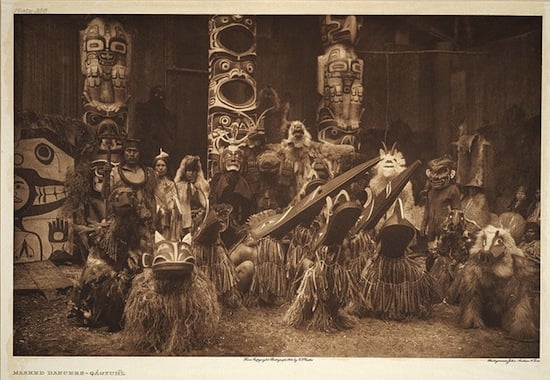
After looking at me Bickley replied:
“How thankful should you be that in our kindness we have spared you.”
“What do you come to do?” inquired Marama again. After the usual formula of consulting me Bickley answered:
“We come to take that mountain (he meant lump) off your neck and make you beautiful; also to cure all the sickness among your people.”
“And I come,” broke in Bastin, “to give you new hearts.”
These announcements evidently caused great excitement. After consultation Marama answered:
“We do not want new hearts as the old ones are good, but we wish to be rid of lumps and sicknesses. If you can do this we will make you gods and worship you and give you many wives.” (Here Bastin held up his hands in horror.) “When will you begin to take away the lumps?”
“To-morrow,” said Bickley. “But learn that if you try to harm us we will bring another wave which will drown all your country.”
Nobody seemed to doubt our capacities in this direction, but one inquiring spirit in a wicker crate did ask how it came about that if we controlled the ocean we had arrived in half a canoe instead of a whole one.
Bickley replied to the effect that it was because the gods always travelled in half-canoes to show their higher nature, which seemed to satisfy everyone. Then we announced that we had seen enough of them for that day and would retire to think. Meanwhile we should be obliged if they would build us a house and keep us supplied with whatever food they had.
“Do the gods eat?” asked the sceptic again.
“That fellow is a confounded radical,” I whispered to Bickley. “Tell him that they do when they come to Orofena.”
He did so, whereon the chief said:
“Would the gods like a nice young girl cooked?”
At this point Bastin retired down the path, realising that he had to do with cannibals. We said that we preferred to look at the girls alive and would meet them again to-morrow morning, when we hoped that the house would be ready.
So our first interview with the inhabitants of Orofena came to an end, on which we congratulated ourselves.
On reaching the remains of the Star of the South we set to work to take stock of what was left to us. Fortunately it proved to be a very great deal. As I think I mentioned, all the passenger part of the yacht lay forward of the bridge, just in front of which the vessel had been broken in two, almost as cleanly as though she were severed by a gigantic knife. Further our stores were forward and practically everything else that belonged to us, even down to Bickley’s instruments and medicines and Bastin’s religious works, to say nothing of a great quantity of tinned food and groceries. Lastly on the deck above the saloon had stood two large lifeboats. Although these were amply secured at the commencement of the gale one of them, that on the port side, was smashed to smithers; probably some spar had fallen upon it. The starboard boat, however, remained intact and so far as we could judge, seaworthy, although the bulwarks were broken by the waves.
“There’s something we can get away in if necessary,” I said.
“Where to?” remarked Bastin. “We don’t know where we are or if there is any other land within a thousand miles. I think we had better stop here as Providence seems to have intended, especially when there is so much work to my hand.”
“Be careful,” answered Bickley, “that the work to your hand does not end in the cutting of all our throats. It is an awkward thing interfering with the religion of savages, and I believe that these untutored children of Nature sometimes eat missionaries.”
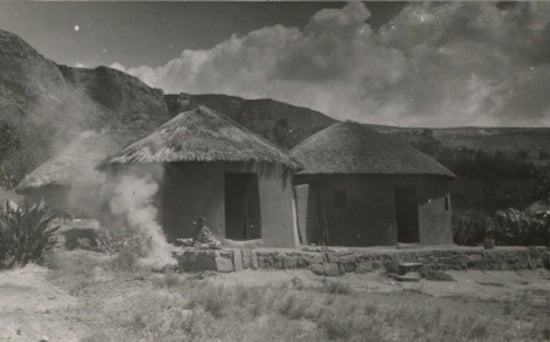
“Yes, I have heard that,” said Bastin; “they bake them first as they do pigs. But I don’t know that they would care to eat me,” and he glanced at his bony limbs, “especially when you are much plumper. Anyhow one can’t stop for a risk of that sort.”
Deigning no reply, Bickley walked away to fetch some fine fish which had been washed up by the tidal wave and were still flapping about in a little pool of salt water. Then we took counsel as to how to make the best of our circumstances, and as a result set to work to tidy up the saloon and cabins, which was not difficult as what remained of the ship lay on an even keel. Also we got out some necessary stores, including paraffin for the swinging lamps with which the ship was fitted in case of accident to the electric light, candles, and the guns we had brought with us so that they might be handy in the event of attack. This done, by the aid of the tools that were in the storerooms, Bickley, who was an excellent carpenter, repaired the saloon door, all that was necessary to keep us private, as the bulkhead still remained.
“Now,” he said triumphantly when he had finished and got the lock and bolts to work to his satisfaction, “we can stand a siege if needed, for as the ship is iron built they can’t even burn us out and that teak door would take some forcing. Also we can shore it up.”
“How about something to eat? I want my tea,” said Bastin.
“Then, my reverend friend,” replied Bickley, “take a couple of the fire buckets and fetch some water from the stream. Also collect driftwood of which there is plenty about, clean those fish and grill them over the saloon stove.”
“I’ll try,” said Bastin, “but I never did any cooking before.”
“No,” replied Bickley, “on second thoughts I will see to that myself, but you can get the fish ready.”
So, with due precautions, Bastin and I fetched water from the stream which we found flowed over the edge of the cliff quite close at hand into a beautiful coral basin that might have been designed for a bath of the nymphs. Indeed one at a time, while the other watched, we undressed and plunged into it, and never was a tub more welcome than after our long days of tempest. Then we returned to find that Bickley had already set the table and was engaged in frying the fish very skilfully on the saloon stove, which proved to be well adapted to the purpose. He was cross, however, when he found that we had bathed and that it was now too late for him to do likewise.
While he was cleaning himself as well as he could in his cabin basin and Bastin was boiling water for tea, suddenly I remembered the letter from the Danish mate Jacobsen. Concluding that it might now be opened as we had certainly parted with most of the Star of the South for the last time, I read it. It was as follows:
“The reason, honoured Sir, that I am leaving the ship is that on the night I tore up the paper, the spirit controlling the planchette wrote these words: ‘After leaving Samoa the Star of the South will be wrecked in a hurricane and everybody on board drowned except A. B. and B. Get out of her! Get out of her! Don’t be a fool, Jacob, unless you want to come over here at once. Take our advice and get out of her and you will live to be old.—SKOLL.”
“Sir, I am not a coward but I know that this will happen, for that spirit which signs itself Skoll never tells a lie. I did try to give the captain a hint to stop at Apia, but he had been drinking and openly cursed me and called me a sneaking cheat. So I am going to run away, of which I am very much ashamed. But I do not wish to be drowned yet as there is a girl whom I want to marry, and my mother I support. You will be safe and I hope you will not think too badly of me.—JACOB JACOBSEN.
“P.S.—It is an awful thing to know the future. Never try to learn that.”
I gave this letter to Bastin and Bickley to read and asked them what they thought of it.
“Coincidence,” said Bickley. “The man is a weak-minded idiot and heard in Samoa that they expected a hurricane.”
“I think,” chimed in Bastin, “that the devil knows how to look after his own at any rate for a little while. I dare say it would have been much better for him to be drowned.”
“At least he is a deserter and failed in his duty. I never wish to hear of him again,” I said.
As a matter of fact I never have. But the incident remains quite unexplained either by Bickley or Bastin.
NEXT WEEK: “It was a great scene, which may be imagined. They bore him away in a litter with the native woman to watch him and another to carry the relic preserved in a basket, and us they acclaimed as gods. Thenceforward we had nothing to fear in Orofena — except Bastin, though this we did not know at the time.”
RADIUM AGE SCIENCE FICTION: “Radium Age” is HILOBROW’s name for the 1904–33 era, which saw the discovery of radioactivity, the revelation that matter itself is constantly in movement — a fitting metaphor for the first decades of the 20th century, during which old scientific, religious, political, and social certainties were shattered. This era also saw the publication of genre-shattering writing by Edgar Rice Burroughs, Sax Rohmer, E.E. “Doc” Smith, Jack London, Arthur Conan Doyle, Aldous Huxley, Olaf Stapledon, Karel Čapek, H.P. Lovecraft, Charlotte Perkins Gilman, Yevgeny Zamyatin, Philip Gordon Wylie, and other pioneers of post-Verne/Wells, pre-Golden Age “science fiction.” More info here.
HILOBOOKS: The mission of HiLoBooks is to serialize novels on HiLobrow; and also, as of 2012, operating as an imprint of Richard Nash’s Cursor, to reissue Radium Age science fiction in beautiful new print editions. So far, we have published Jack London’s The Scarlet Plague, Rudyard Kipling’s With the Night Mail (and “As Easy as A.B.C.”), Arthur Conan Doyle’s The Poison Belt, H. Rider Haggard’s When the World Shook, Edward Shanks’s The People of the Ruins, William Hope Hodgson’s The Night Land, and J.D. Beresford’s Goslings. Forthcoming: E.V. Odle’s The Clockwork Man, Cicely Hamilton’s Theodore Savage, and Muriel Jaeger’s The Man with Six Senses. For more information, visit the HiLoBooks homepage.
READ: You are reading H. Rider Haggard’s When The World Shook. Also read our serialization of: Jack London’s The Scarlet Plague | Rudyard Kipling’s With the Night Mail and “As Easy As A.B.C.”
ORIGINAL FICTION: HILOBROW has serialized three novels: James Parker’s The Ballad of Cocky The Fox (“a proof-of-concept that serialization can work on the Internet” — The Atlantic) and Karinne Keithley Syers’s Linda Linda Linda. We also publish original stories and comics.
